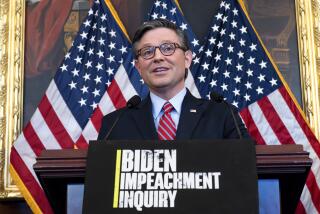Push for Impeachment Inquiry Causing Alarm in GOP Ranks
- Share via
WASHINGTON — When Republican Bob Barr was U.S. attorney in Atlanta a decade ago, he convicted a GOP congressman involved in money laundering, stirring enough resentment among party stalwarts to threaten Barr’s political future.
But he rode out that storm, and in 1994 he won his own House seat. And once again he is upsetting fellow Republicans with his prosecutorial zeal. This time, however, his target is a Democrat--President Clinton.
Long before Monica S. Lewinsky became nationally known, Barr was pushing his colleagues on the House Judiciary Committee to launch an inquiry into whether various ethical controversies swirling around the president provided grounds for impeachment. But given Clinton’s high poll ratings, it’s no surprise that Barr’s prodding has caused alarm among his GOP colleagues.
But Barr is undeterred, having learned how to take the heat when he was prosecuting then-Rep. Pat Swindall of Georgia. “What silences critics is results,” the 49-year-old Barr said.
Some believe that Barr in the long run may provide a service for his party, and arguably the nation. That’s because his rationale provides a framework for examining the allegations without tackling the controversy over the relevance of Clinton’s private behavior.
Barr claims that, from the start, he has been trying to raise an issue that goes to the heart of the workings of democratic government--abuse of power--rather than questions of sexual morality.
His concerns about Clinton, Barr said, are exemplified by the White House having gained access to confidential FBI files on key Republicans, as well as allegations of fund-raising abuses, which the Georgia congressman believes may have opened the door to foreign influence on U.S. policy-making.
As for the allegations that Clinton had an affair with Lewinsky and was part of an effort to get her to lie about it, Barr said he is interested only in the possibility that the president might have used his power to obstruct an investigation of his behavior.
For that reason, Barr maintains that last week’s dismissal of the Paula Corbin Jones sexual harassment case will have no effect on his efforts. “My focus is what has the president done in his capacity as president that would substantiate the charge of abuse of his office,” Barr said. “We the people of this country have a decision to make about whether we have any standards--other than whether the economy is OK--for holding our leaders accountable for their conduct in office.”
And the way to make that decision, Barr argues, is through a vote on the House floor.
Clinton’s defenders violently disagree with Barr’s definition of the issue. And even Barr’s supporters concede that the odds against impeachment are great.
But Barr notes that he’s only asking for an inquiry, not impeachment. And if the House should support that idea--a decision it will have to face when independent counsel Kenneth W. Starr turns over his report on Clinton--the probe could serve the purpose of clearing the air.
“If the president of the U.S. is guilty of high crimes and misdemeanors, he should not be in office,” said Rep. Tom Campbell (R-San Jose), a moderate who surprised many when he signed on as a sponsor of the Barr resolution seeking an impeachment inquiry. “But if [Clinton] is not guilty, his efficiency is suffering, in my judgment. So the patriotic thing to do is to resolve it quickly.”
An inquiry also could offer Republicans considerable political benefit, Johns Hopkins University political scientist Ben Ginsberg contends. A sustained inquiry--even if impeachment never comes to a vote--would serve the purpose of “continuing to keep the Clinton legislative agenda in the background,” Ginsberg said.
Even as Barr tries to sell his case to skeptical colleagues, he has to be concerned about his own credibility on the issue of ethics. That point was driven home last week when the Federal Election Commission disclosed that an audit of his 1996 campaign had turned up violations, including collecting $55,000 in excess contributions. Barr’s lawyer said the money had been returned and steps were taken to prevent future violations.
More to Read
Sign up for Essential California
The most important California stories and recommendations in your inbox every morning.
You may occasionally receive promotional content from the Los Angeles Times.










